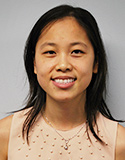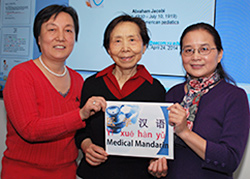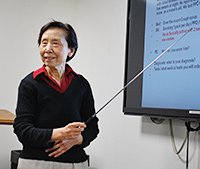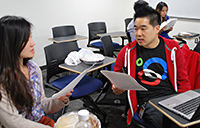

Bridging Communication Barriers
Medical Mandarin: Offering Further Means of Communication with Patients
In Einstein's new Education Center, located in the Leo Forchheimer Medical Sciences Building, seven first-year students listened attentively as Dr. Shun-Mei Liu, discussed aspects of a pediatric patient interview. She reminded the students that this is one of the few times when they may not be addressing the patient directly. She then reviewed how they might determine the child's age, quizzing them on how to say newborn (xin sheng ér), infant (ying'ér) and toddler (yòu ér).

Second-year medical student Kelly Chen helped recruit classmates to pilot the course"The students were attending a session of Yi Xué Hàn Yu, or Medical Mandarin. The elective, piloted at Einstein last fall with second-year students, allows those with some Mandarin-speaking experience to learn medical terms and topics that will enable them to converse in a clinical setting.
"We don't just learn terms; it's conversational," said Samuel Chan for whom Mandarin is his third language, after English and Cantonese.
Mastering Clinical Conversations
While each of the students in the course has some experience with speaking Mandarin, their levels of understanding vary. Some grew up speaking Mandarin at home, while others learned it as adults. In spite of their differing levels of experience, they agreed that the hands-on class works because its three instructors—Dr. Liu, Yu Lin and Dr. Xue-liang Du—lead interactive lessons in which they can help one another whenever they stumble over words.

The courses' three instructors (from left): Dr. Xue-liang Du, Dr. Shun-Mei Liu and Yu LinEach 90-minute class consists of two parts: While the first half of class focuses on learning Mandarin medical terms relevant to a particular organ system, during the latter portion students interact in Mandarin, alternating the doctor and patient roles. They practice using Mandarin phrases to obtain a patient's medical history, determine what the problem may be and explain how the particular ailment can be treated.
Serving Patients' Needs
"It's reassuring for Mandarin-speaking patients to hear a doctor speak their language," said student Hao Wu. "Quite often, patients bring children or grandchildren with them to translate."
"Being able to speak to a doctor in their native tongue is critical for patients, because nothing is lost in translation," noted Dr. Streamson Chua, professor of medicine and of neuroscience, and faculty advisor for the course. "It helps to build trust, too, since patients may be uncomfortable telling their relatives certain things. So being able to talk directly with the doctor is important to providing the best care possible."

Dr. Liu reviews useful words and phrases for conducting a pediatric exam"The aim of our program is to remove communication barriers, while giving the students the tools they need to interact effectively with patients in their native tongue," added Ms. Lin.
"Being able to offer greetings helps us to put ourselves on the same level as the patient," said Brandon Trapp, who learned Mandarin while studying at the Beijing Foreign Studies University and living with a family that didn't speak any English. "I hope to work abroad after med school and, if I end up in China, these lessons will serve me well."
Meeting an Increasing Demand
But Einstein students don't have to leave New York City to ask patients, "You shen me wo neng bang ni de?"—which means "How may I help you?"
At Maimonides Medical Center, in Brooklyn, an Einstein affiliate where students receive training, the increase in Chinese patients coming into the emergency room led hospital administrators to add round-the-clock coverage of patient representatives fluent in Mandarin and Cantonese, according to the medical center's website.
And, the need for Mandarin-speaking doctors in New York City may be on the rise. "Because of the Affordable Care Act, more Mandarin-speaking immigrants in New York City will likely seek medical care," observed Dr. Chua.
From Idea to Elective Course

Students pair up to practice their conversation skillsKelly Chen, now a second-year student, wondered about starting a Medical Mandarin class at Einstein while sitting in her Medical Spanish class during first year. "I first noticed the need for multi-lingual doctors when I volunteered at the emergency department at Bellevue Hospital Center before coming to Einstein," she said. "Doctors would ask for my help with Chinese patients to find out things like where the patient's pain was, when it was hurting and other kinds of basic information that they couldn't get without me."
She discussed the idea with Dr. Marti Grayson, associate dean for the office of medical education, and was encouraged to establish a pilot for the course. She recruited 15 of her classmates to take part.
Even if one is conversant in Mandarin, there can be challenges. "You can't get a direct translation for some words," said Ms. Lin. "English phrases like ‘cough syrup' or ‘over-the-counter' can be tricky."
One class favorite, which Ms. Lin highlighted in her PowerPoint presentation, showed a mother cradling a "ying'er," or newborn. Next to it, she had noted "xin gan," which typically means "darling." But in medical terms, the individual words "xin and gan" translate to "heart" and "liver," respectively.
"While it's fun, it's also so very important to be aware of how words like these might be used and perceived so that they are used properly," said Ms. Lin. "Because understanding a patient's needs or concerns is what allows doctors to give the best care possible."
Posted on: Thursday, May 22, 2014


